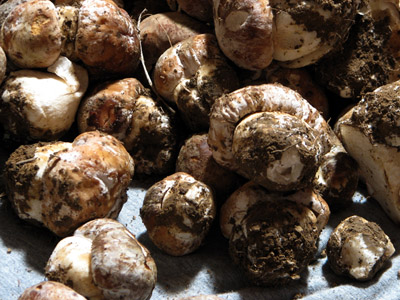Boletivores
October 31st, 2007 by: joshua
Washington County, Oregon (800×600)
Hans and I stumbled across these at twilight and ended up crawling through the brush in the dark digging them up by flashlight. We’re calling them Boletus aereus (Queen Bolete) even though we discovered them in a thicket of fir trees. Otherwise, it could be some mutant form of Boletus edulis with whitish bloom on the cap. Or it could be an as yet unnamed species. We can tell you they are very yummy and skirt the whole issue by calling them porcini or cep. Common names just don’t require the same precision.

The pilot light alone provides just enough heat and air circulation to dry mushrooms perfectly and fill the house with the earthy smell of porcini.
Cheyenne and I went back this morning to make sure we didn’t miss any. There were a few, but Hans and I had done pretty well on the first pass.

An easy one for the fungal taxonomist (Amanita muscaria).


October 31st, 2007 at 6:06 pm
Fergawdsakes be careful with wild shrooms in the button stage…it’s prety easy for something bad to ‘sneak’ in there.
October 31st, 2007 at 6:58 pm
(Dude! You’re going to give my mother a heart attack!)
Seriously though, boletes have pores (looks like a dense sponge) and not gills, and so are easily distinguished from things such as amanitas. Plus, even when young you can readily see pores versus gills in, for example, a veiled mushroom (like an amanita ‘button’). Also, boletes that do not stain blue or have red on the stalks are edible. We have found both queens and kings before, too, and are familiar with the genus in general.
Incidentally (mom, don’t read this) we DID actually find a lot of amanitas in the area–of course the muscarias above–but also what may have been an ocreata, the really poisonous one (called “destroying angel” because they are deadly poisonous and pure white).
October 31st, 2007 at 9:55 pm
This is just a myth from the fugiphobes. It’s true that it can be difficult to distinguish species of Amanita in the button stage. However, there is no sweat sorting an Amanita from a Boletus (or an Amanita from anything else).
November 1st, 2007 at 10:41 am
Aarrggh! I’ve been hoping you two were staying out of the woods. Even an upset stomach from some slightly poisonous ‘shrooms can be quite risky to the baby and to the parents. So thank you “Bozo” for validating my paranoia about wild mushrooms. It just isn’t worth the risk.
—Mom, queen of the fungiphobes
November 1st, 2007 at 11:23 am
Wild mushrooms in cream sauce.
Yummmmmmmmmmm.
November 1st, 2007 at 5:59 pm
I am so with you Peg!
Mom in Cheshire
November 2nd, 2007 at 12:15 pm
“…. myth from the fungiphobes…”
Not a fungiphobe, I eat wild mushrooms myself, but am double-plus extra careful with buttons… If I’m not 110% sure, it gets tossed. [The old ‘if in doubt, throw it out’ advice.] It sounds like you know what you’re doing though… so disregard my carping.
Peg & Mom… not to worry. Wild mushrooms are very safe as long as you’re careful and cautious. I’ve eaten them for 50 years or so… and I’m still here.